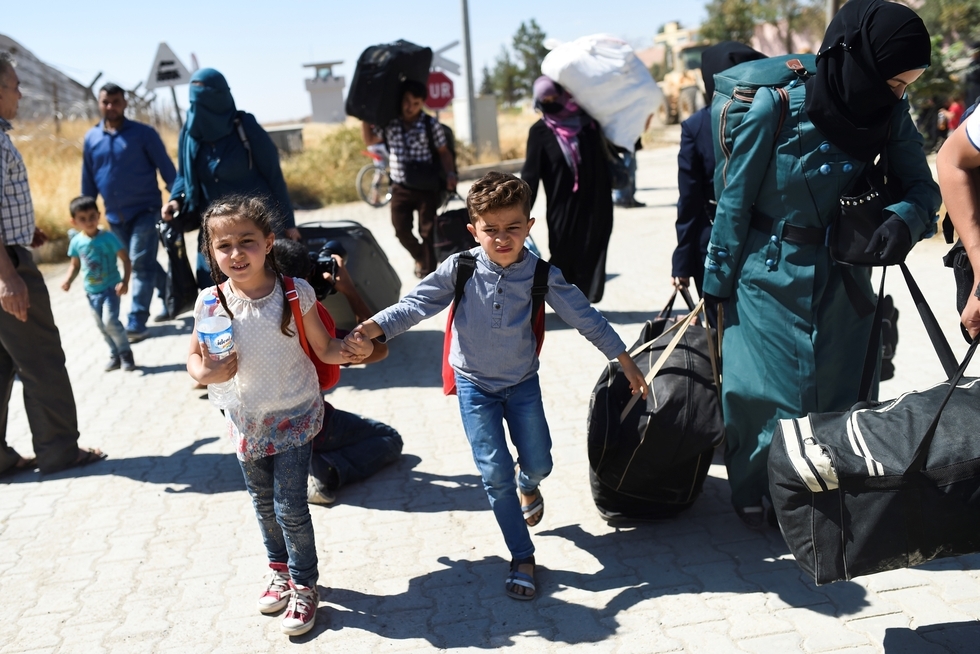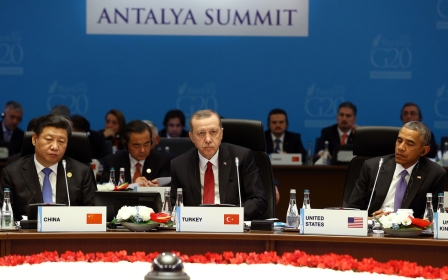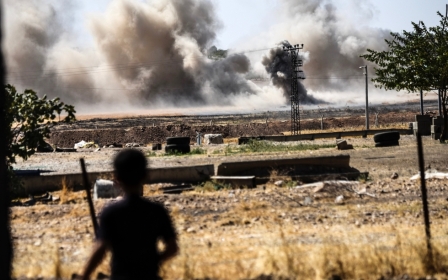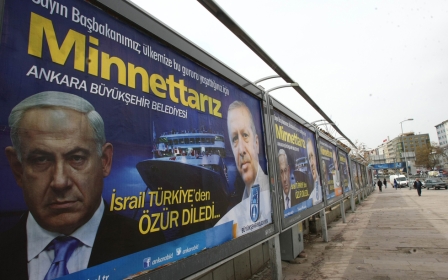Turkish anti-terror offensive in Syria is succeeding where others failed

The Syrian crisis is a vicious political circle. While the Baath regime is the number one initiator of this circle, non-neighbouring countries have also inserted themselves into the crisis.
Beyond mere tactics, all of these actors have failed to develop strategies in Syria and have made tremendous efforts to conceal the most basic facts about how this crisis could be solved.
Three main factors are seen in the policies, approaches and analyses that have been adopted in Syria since March 2011. The first is the analyses which began in Syria but end at a point irrelevant and unrelated to Syria.
The second is the efforts that have been shown to protect the Assad regime before and after the rise of the Islamic State (IS) militant group, and the third is to conceal in Syria, in the most unethical way, the biggest human tragedy that has ever happened.
Most of the non-neighbouring actors have interpreted the Syrian crisis as an opportunity to stop Arab uprisings rather than seeing it as an insurrection of Syrians against the decades-old Baath dictatorship.
Rather than long-term regional and global stability, these powers have invested in short-term gains which have seen the growth of terrorism around the world and the associated mass-migration problem.
Subsequently, nobody talks about the Assad regime anymore - despite the fact that it has killed hundreds of thousands of people in Syria, used chemical weapons, explicitly invited terror groups into the country and then helped their propagation, and caused the migration of millions of people.
Assad as catalyst
Of course, those who have protected the Assad regime, either directly and indirectly, have not done it out of love.
A bloody and chaotic catalyst was needed to stop the wave of change that the Arab uprisings triggered with the overthrows of Zine El Abidine Ben Ali, Muammar Gaddafi and Hosni Mubarak, the loss of control of Nouri al Maliki’s administration in Iraq and the deepened embargo on Gaza by Israel.
As it has become evident that neither regional regimes nor Western countries can rationalise or deal with what has happened in Syria, both have invested in Assad as a key player in the Middle East counter-revolution.
The uprisings turned into such a grave human tragedy that even demands for the most basic human rights and democracy were perceived as justification for the bloody chaos that followed. The old order came back in Egypt, instability deepened in Libya, and the old status quo has been enlivened in Tunisia.
As these events have unfolded, Turkey has remained the only country sustaining the same position since day one, one which continues to underline the fact that the main source of the problem is regimes that have shed blood to suppress popular demands for change.
Turkey has insisted that regional and global terrorism will continue to escalate unless the Assad regime massacres are stopped and that the global migration problem cannot be controlled unless a safe zone inside Syria is established.
Those who have ignored Turkey’s warnings have continued to support proxy wars in Syria and also taken steps to pose a threat to Syria’s territorial integrity. These approaches have led to the growth and expansion over the past five years of IS and the PKK, who killed hundreds of civilians, soldiers and policemen over the past year in Turkey.
The sincerity test
For the short-term-minded proxy bosses, IS has been a convenient enemy that has allowed them to paint Syria as merely a fight against the group. We see a grotesque picture here.
The coalition has managed, directly or indirectly, to bring together the US and Russia, Iran and Israel, Saudi Arabia and Iraq, against IS, yet the organisation survives.
Of course, the reason is not that IS is so strong, but that the coalition has no answer to what will happen to Syria if IS is defeated.
In other words, those who thought that they had subdued the demands of the Syrian people in the early days of the crisis with the trick-question of “What will happen after Assad?” are now unable to answer what will happen to either Assad or to the country in a post-IS Syria.
When viewed from the standpoint of those who still hope to benefit from proxy wars, the survival of the Assad regime, and the chaos in Syria, the presence or the absence of IS has produced similar crises.
It is for this reason that as soon as Turkey crossed the border, those who for years accused Turkey of not fighting IS, called Turkey’s campaign against IS “an occupation” - almost turning themselves into defenders of IS.
Turkey’s recommendation
The solution of this vicious circle would have been possible if world powers had paid attention to Turkey’s warnings over the past few years. There were four:
- The real source of the problem is the Assad regime
- A safe zone is a must to prevent further human tragedy and the migration crisis
- A battle on the ground is necessary to have an effective fight against IS and other terror organisations
- Rebel zones and ethnic or religion-based splits must not be allowed as the massacre continues in Syria.
Today, there does not exist a more realistic recommendation for the Syrian crisis.
PKK and Assad
Another point that is of interest to Turkey in the Syrian crisis is the PKK in Syria. The relation between the PKK and the Assad regime is not a new phenomenon. Kurds in Syria are an ethnic group who have been exposed to the heaviest suppression by the Baath regime.
As Kurds have suffered from the bloody atrocities of the Baath regime for years, the PKK leader, Abdullah Ocalan, under the protection of the Assad regime, had a comfortable life for years in Damascus while the PKK would not even think of asking questions about what would happen to the Syrian Kurds or about the atrocities Kurds faced in Syria.
The Syrian Kurds were given a bit of relief only in the period between 2003 and 2011 owing to the fact that Turkish President Recep Tayyip Erdogan had intensified his discussions with Assad about the issue when Turkey and Syria were on good terms.
During the same period, the relation between the Assad regime and the PKK was pretty much broken, but has been restored with the Syrian uprising.
In the pre-2011 period, the PKK’s presence among the Syrian Kurds was negligible both socially and organisationally. However, the PKK has morphed into a phony actor in the power vacuum through the assistance and the armament provided by Western countries and Assad.
The PKK-PYD first attacked various organised Kurdish groups in Syria and then subjected Arab and Turkmen groups to a form of ethnic cleansing.
The PKK-PYD has gained ground by pursuiing IS and has mostly gained legitimacy from allegedly being “the group fighting against IS”. The first wave of the migration of hundreds of thousands of Syrian Kurds to Turkey included Kurds who escaped from the PKK.
The PKK-PYD not only has formed an IS or Hezbollah-like “private rebel zone” in northern Syria, but the groups have also organised suicide attacks and terror acts to kill hundreds of civilians and security officers in Turkey since July 2015.
During the summer of 2016, in particular, both PKK-PYD and IS terrorism have escalated in Turkey. Hence, Turkey was compelled to carry out a direct cross-border operation.
Irrelevant elements and actors
None of those who think that they have a say in the Syrian crisis or who have been, somehow, involved in this crisis, has any geographical connection to Syria; they do not even face any security-related political or social risk originating from Syria.
Turkey, on the other hand, sharing almost about a 1,000 kilometre-long border with Syria and hosting three million Syrian refugees, is affected by every development in Syria.
Those who forgot this cold fact yesterday as they chased a dream along the Turkey-Syria border, disturbing geopolitical reality, will most likely have difficulty in understanding today why Turkey has entered Syria to fight IS.
The PKK-PYD has been backed by a global coalition for almost four years. Those who have concocted an exaggerated saga of the PKK-PYD’s fight against IS had better see how IS has been defeated by the Free Syrian Army with a modest support from Turkey in only four days.
Those who kept saying for years that the key concern in Syria is IS should now explain why they have not taken any step to settle this “priority issue”.
If they are still unable to make this self-criticism, then we are entitled to question who will become irrelevant elements and actors in Syria when IS is defeated.
- Taha Ozhan is a member of Turkish Parliament and chairman of Foreign Affairs Committee. He is an academic and writer. Ozhan holds a PhD on Politics and International Relations. He frequently comments and writes for international media. His latest book, Turkey and the crisis of Sykes-Picot Order (2015).
The views expressed in this article belong to the author and do not necessarily reflect the editorial policy of Middle East Eye.
Photo: Syrian refugees walk back to the Syrian city of Jarabulus on 7 September 2016 at Karkamis border gate, following the Turkish seizure of the town from Islamic State group. (AFP)
New MEE newsletter: Jerusalem Dispatch
Sign up to get the latest insights and analysis on Israel-Palestine, alongside Turkey Unpacked and other MEE newsletters
Middle East Eye delivers independent and unrivalled coverage and analysis of the Middle East, North Africa and beyond. To learn more about republishing this content and the associated fees, please fill out this form. More about MEE can be found here.





